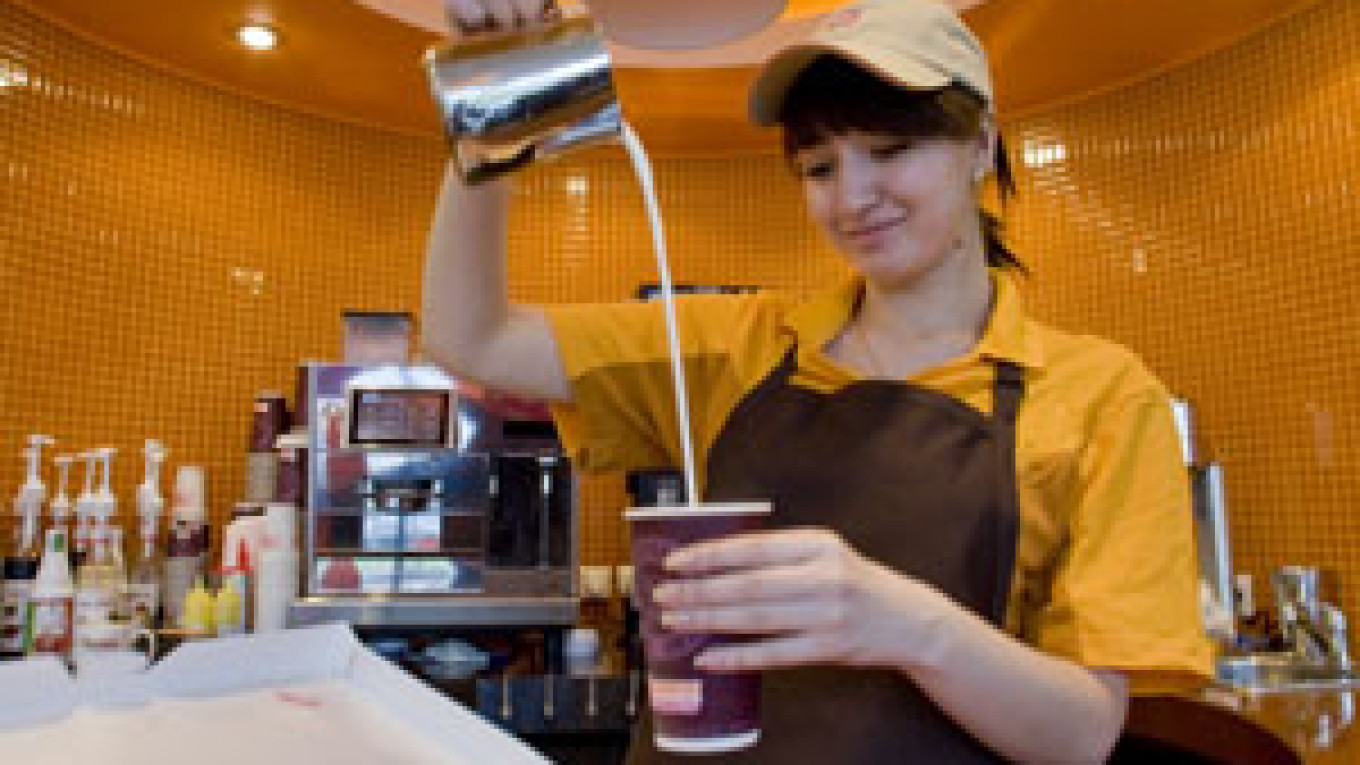Dunkin' Donuts, the U.S. eatery that left Russia after a three-year stint in the 1990s, has returned to Moscow with big plans for rapid expansion.
The company first came to Moscow in 1996, but closed abruptly in 1999, deciding to cut its losses after having taken a big hit during the 1998 crisis. Internationally, the brand expanded over the following decade, especially in Asia, where 2,000 of its 3,000 international cafes are now located.
Ten years later, Russians are more receptive to international brands, and coffee has become an increasingly popular social activity, while the brand has more experience and can better adapt to the local environment, Tony Pavese, chief executive of the company's international division, said Wednesday. "Russia is the next step in our European strategy," he said.
The company will open its first location at 17 Novy Arbat on May 11, where it will serve doughnuts and coffee. The opening was originally scheduled for Wednesday, but it was pushed back after deliveries were interrupted by the eruption of the Icelandic volcano, which closed airspace over Europe.
The next cafe will open at 8 Altufyevskoye Shosse in northern Moscow. Outside of the capital, the chain aims to expand first to St. Petersburg, Sochi, Novosibirsk, Krasnodar and Yekaterinburg.
Moscow locations will offer free delivery throughout the city, but only to customers who have registered on their web site.
The cafes, which have a special "international design" differentiating them from their U.S. counterparts, will be operated by Donuts Project, which has exclusive rights to the franchise in Russia and Ukraine. At least 50 locations will be opened in Moscow in the next three to five years, including up to 20 by the end of this year, Donuts Project CEO Konstantin Petrov said.
While Russians may be unused to the colorful assortment of doughnuts behind the cafe's glass counter, Petrov said doughnuts are a close relative of the Russian sweet fried dessert ponchik, which was especially popular during Soviet times.
While ponchiks are considered to be more of a fast-food item in Moscow, they are considered to be a homemade desert in the regions, he said. Ponchiks are for everyone, Petrov said excitedly, after quoting lines from a Vladimir Mayakovsky poem: "Petya, out on the balcony, gobbled up a sweet ponchik."
To cater to Russian tastes, the chain will offer more substantial food choices, such as salads and sandwiches, alongside the doughnuts. It will also use fillings like raspberry jam and custard that are more suited to the Russian palate, Petrov said.
The company will import 70 percent of its ingredients from abroad and buy the rest from local suppliers, but it is willing to localize its supply lines further if more certified Russian producers can be found.
Petrov, a Donetsk native who owns 15 restaurants in Ukraine, said total investment into the chain would be 300 million to 400 million rubles ($10 million to $14 million) in the first year. Petrov is investing 50 percent, with the rest coming from other unidentified investors.
A Message from The Moscow Times:
Dear readers,
We are facing unprecedented challenges. Russia's Prosecutor General's Office has designated The Moscow Times as an "undesirable" organization, criminalizing our work and putting our staff at risk of prosecution. This follows our earlier unjust labeling as a "foreign agent."
These actions are direct attempts to silence independent journalism in Russia. The authorities claim our work "discredits the decisions of the Russian leadership." We see things differently: we strive to provide accurate, unbiased reporting on Russia.
We, the journalists of The Moscow Times, refuse to be silenced. But to continue our work, we need your help.
Your support, no matter how small, makes a world of difference. If you can, please support us monthly starting from just $2. It's quick to set up, and every contribution makes a significant impact.
By supporting The Moscow Times, you're defending open, independent journalism in the face of repression. Thank you for standing with us.
Remind me later.


